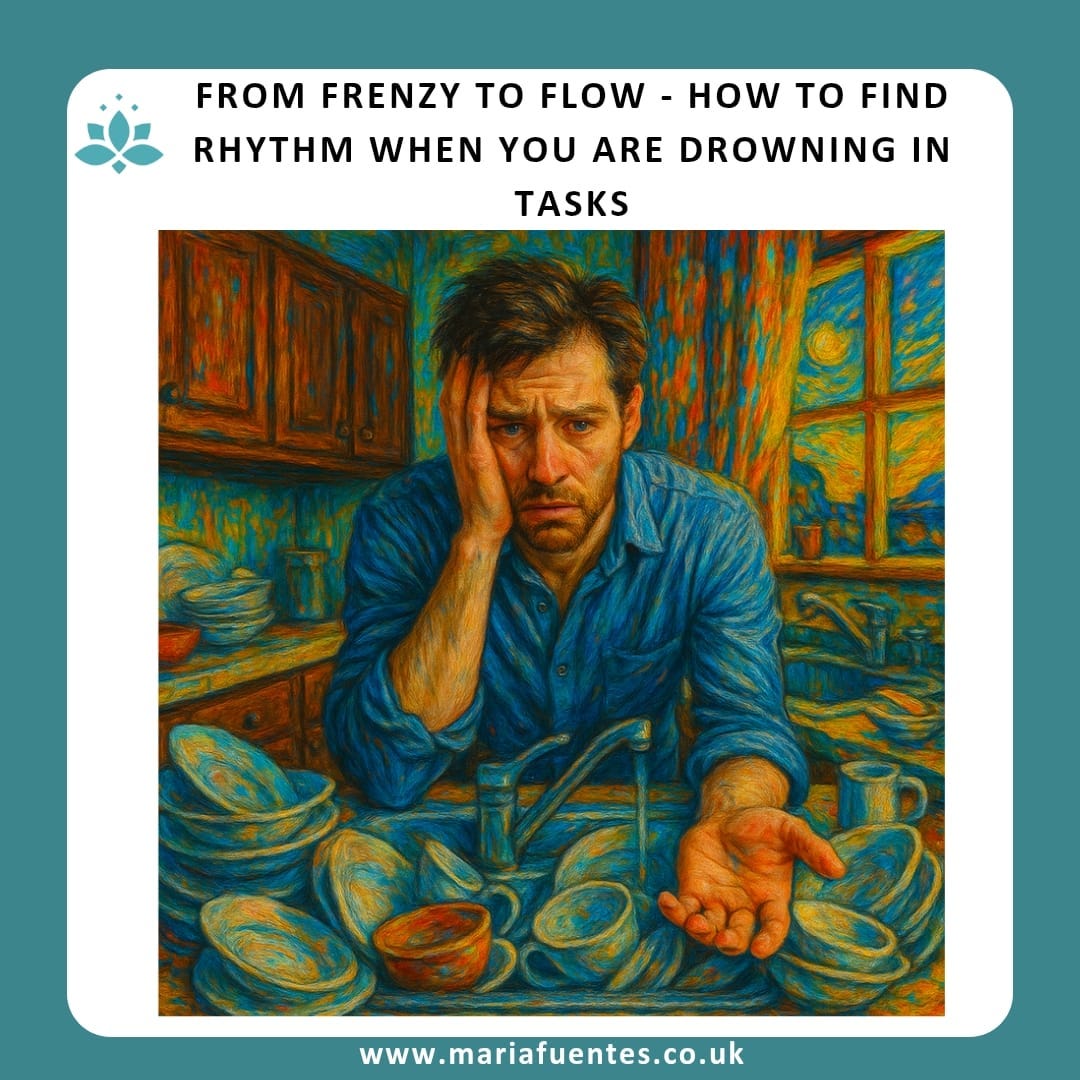From Frenzy to Flow - How to Find Rhythm When You Are Drowning in Tasks
You wake up with your to-do list already breathing down your neck. Emails, meetings, messages, expectations. Before the day even starts, your nervous system is in survival mode.
It is not that you are lazy. It is that everything feels urgent, and nothing feels clear. The more you do, the less grounded you feel. You are not just busy; you are scattered.
And in that scattered state, focus becomes a memory. Flow feels like a luxury you cannot afford.
The Hidden Cost of Being Always On
Research from Stanford University shows that multitasking reduces productivity by up to 40%. Even worse, it increases cortisol, the body's stress hormone, leading to emotional fatigue and decision fatigue. (Source)
You are not just losing time. You are losing access to your best thinking.
The Sink Is Full Again
Think of your mind like a kitchen sink. One or two plates, you can manage. But when the sink is full coffee mugs, cutlery, pans from three meals ago, you do not want to look at it. The sight alone spikes your stress.
That is what your brain feels like when you constantly carry half-finished thoughts and unprocessed tasks. Every time you try to focus, the clutter tugs at you. The mental equivalent of, "I really should wash those dishes." You cannot reach clarity in chaos.
To find flow, you need to clear the sink.
What We Can Learn From Japan's Rhythm
In Japanese culture, there is a concept called ma—the space between things. It is the pause that gives meaning to action, the silence that gives music its shape. Unlike the Western obsession with constant output, ma honours rhythm. It understands that stillness is not a waste of time but a source of strength.
In traditional Japanese architecture, in tea ceremonies, and even in the pacing of conversation, this respect for intervals reflects a deeper belief: that clarity arises in the space we protect, not the chaos we endure.
Western hustle culture glorifies the packed calendar. But rhythm, as Japan teaches, is not about doing less or more. It is about knowing when to stop.
Why This Feels So Familiar
Part of the reason it is hard to stop is that frenzy becomes identity. You feel productive in motion, even if the motion is frantic. But the truth is that there is a difference between momentum and noise.
One moves you forward. The other wears you down.
A Lesson From Marie Curie
Marie Curie, the first woman to win a Nobel Prize and the only person to win it in two different sciences, was known for her intensity. But her brilliance came not from chaos, but from deep focus. She structured her time meticulously and protected her ability to think. She understood that true breakthroughs come not from doing everything but from being able to see what matters most.
If Curie had tried to work the way many of us do today, juggling constant input and external pressure she would not have had the space to discover anything.
A Better Way to Regain Flow
Start with a "mental rinse" –
Set a timer for five minutes and write down every single task, thought or worry circling your brain. Get it all out.
Name your top two priorities –
Not ten. Two. These are your anchors.
Batch your tasks –
Group similar activities together. Context switching is one of the biggest drains on your brain.
Build reset rituals –
Between meetings or major shifts in focus, take one minute to close your eyes, breathe deeply and reset your posture. Rhythm is built through recovery.
One Client's Rhythm Shift
When Alex, a creative director, came to me, he was running on empty. His calendar was packed, his inbox unmanageable, and his sleep broken. He was succeeding on the outside but fraying on the inside.
We did not overhaul his system overnight. We started with rhythm. Every morning began with a three-minute reset. Every project started with two clear outcomes. He shut down his screen at 8 p.m., no matter what.
Within a month, he reported better clarity, faster execution, and most surprisingly more joy.
Because rhythm is not restriction, it is permission to breathe again.
You Do Not Need to Do More
You need to do fewer things with more presence.
Flow is not a gift for the lucky. It is a discipline for the committed.
And it starts by clearing the sink.
For those seeking actionable solutions to find rhythm and regain control when you're drowning in tasks, click the button below!
Remember, acknowledging the problem is the first step towards finding a solution.
If however, you need further help, do not doubt to reach out.
We're all ears!
What burning questions or areas of personal or professional development would you like us to address in future posts?
About the Author
Maria Fuentes is an author, renowned Breakthrough Coach, and Performance Strategist with a finance and management background, committed to helping professionals achieve peak performance in their personal and professional lives. With a tailored approach centred on emotional intelligence and leadership development, she has over a decade of experience empowering individuals to reach their full potential.
In addition to group workshops, Maria Fuentes offers one-to-one coaching sessions to provide personalised guidance and support. Through her consultancy firm, Maria Fuentes Breakthrough Coaching, she designs customised coaching programmes that foster growth, resilience, and emotional intelligence in leaders. Working closely with her clients, Maria Fuentes creates a supportive environment that encourages self-discovery, skill development, and the achievement of ambitious goals.
Maria Fuentes





